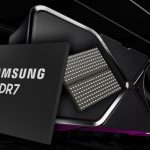Korean chaebol Samsung’s chipmaking division Samsung foundry has laid out new plans for its advanced chipmaking processes. Samsung Foundry is one of two global contract chip manufacturers that are capable of making semiconductors with advanced technologies, and the company took the lead earlier this year when it announced that it was starting early stage chip manufacturing with the 3-nanometer process. The announcement served to provide Samsung a lead over its only rival, the Taiwan Semiconductor Manufacturing Company (TSMC), which is slated to kick off 3nm mass production during this year’s second half.
Now, at its technology event in the U.S, Samsung has shared plans for newer technologies and shared that it plans to triple its manufacturing capacity for advanced processes by 2027. The technologies include 2nm and 1.4nm, alongside a new cleanroom strategy that the company believes will let it easily scale up production to meet potential demand increases.
Samsung Aims to Triple Its Advanced Chipmaking Capacity By 2027
Samsung’s fortunes in the chipmaking world have been at the center of controversy of late, as persistent reports in the press have outlined problems with some of the company’s latest technologies. These have resulted in management shuffles at Samsung, with some reports claiming that the yield, which refers to the number of usable chips in a silicon wafer, was falsified by executives.
Now, Samsung appears to move forward as at its Samsung Foundry Event, the company has shared plans for newer manufacturing technologies and production capacities. Samsung has outlined that it aims to begin mass production of its 2nm technology by 2025, and the more advanced follow-up 1.4nm by 2027.
This timeline puts Samsung at par with TSMC, which also plans to kick off 2nm manufacturing in 2025. The Taiwanese company reiterated this timeline at its own foundry event in September, with TSMC’s senior vice president for research and development and technology Dr. Y.J. Mii insinuating that his company will use advanced machines for the newer technology.
Samsung Foundry’s diagram showing the evolution of a transistor from FinFET to GAAFET and then MBCFET.The 3nm process from the Korean company will utilize GAAFET transistors, which it has developed in partnership with International Business Machines Corporation (IBM). However, Samsung’s production efficiency has long raised some questions in the industry for its previous chip technologies. Image: Samsung Electronics
Samsung and TSMC’s 3nm chips are similar only in nomenclature, as the Korean company uses an advanced form of transistor dubbed ‘GAAFET’ for its chips. GAAFET stands for Gate All Around FinFET, and it exposes more circuit areas for improved performance.
TSMC plans to shift to similar transistors with its 2nm process, and by that time the firm also aims to bring newer chipmaking machines dubbed ‘High NA’ online. These machines have wider lenses that allow chipmakers to print precise circuit designs on a silicon wafer, and they are highly sought after in the chipmaking world as they are built only by the Dutch firm ASML and are booked years in advance.
Samsung also plans to triple its advanced chip manufacturing capacity over current levels by 2027. The company also shared its “Shell First” manufacturing strategy at the foundry event, where it outlined that it will build physical facilities such as cleanrooms first and then populate them with chipmaking machines should the demand materialize. Production capacity is a ‘hide and seek’ game in the chip manufacturing industry, with companies often investing hefty sums to bring capacity online, only to worry about overinvestment later on if the demand fails to materialize.
This strategy is similar to the one being employed by Intel Corporation, through which the company will also create ‘optional capacity’ through a plan dubbed Smart Capital.
The post Samsung Breathes Down TSMC’s Neck – Announces 2nm Manufacturing For 2025 by Ramish Zafar appeared first on Wccftech.







